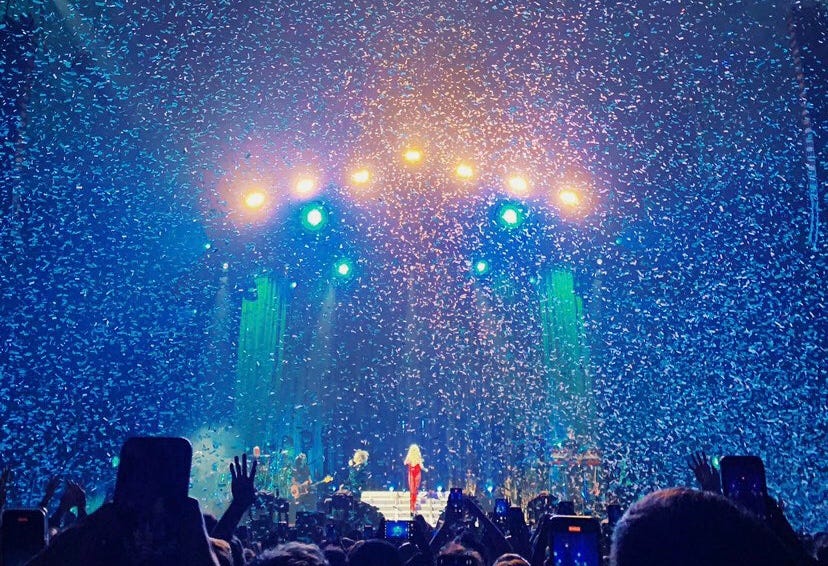Carly Rae Jepsen at Alexandra Palace
The star capitalized on a deep repertoire of sugary, catchy hooks in a venue fit for royalty.
Before performing her internet-breaking single “Call Me Maybe” at Alexandra Palace in London, Carly Rae Jepsen announced to the crowd, “You have to sing along to this next one… it’s like, the law.” But for such a pop idol as herself, it was more than that: it was a royal mandate.
Jepsen released her most recent album, The Loneliest Time, on Oct. 21 of last year. Jepsen seeks to face her struggles, singing the line “I paid to toughen up in therapy” in album and concert opener “Surrender My Heart.” However, Jepsen’s acknowledgement of hard times has certainly not freed her from them. She recalls her slow and difficult rise to fame in an interview with The Guardian, describing how at one point she exchanged banana bread for practice time with her band because she was unable to pay them. If anyone deserves the massive crowd at Alexandra Palace, it’s her.
For Jepsen, these past issues are of little concern on the So Nice Tour. The concert itself was electric. Jepsen is regularly discarded as a one hit wonder, but to those “in the know,” she represents an evergreen artist who earnestly captures a variety of pop sounds and styles. It is this exact fanbase that arrived at Alexandra Palace.
Jepsen’s devoted audience provided an energetic accompaniment to every chorus. Iconic songs like the classic “Call Me Maybe” and “I Really Really Like You” were spaced out and placed between cuts from her most recent album, which lack many of the catchy melodies of her early tracks but retain much of the same charm. Other songs ranged from well known “Run Away With Me” to deep cuts like “Felt This Way” from Dedicated Side B. Jepsen’s sound has largely shifted from 80s inspired synth pop to slower, more eclectic jams. She’s more introspective, self-critical, and self-aware.
The Loneliest Time itself lacks the pop hits of her previous records, but the improved recording and earnestness make up for its flaws. It is indicative of a certain type of quarantine album. It is the story of someone who has done the work: gone to therapy, faced their trauma, read the books, and become ready to face the world. For Beyonce, it meant going clubbing; for Kendrick, it meant choosing his family; for Carly Rae Jepsen, it meant returning to herself (see “I’m coming back for you, baby!”). This does not mean she’s outgrown any sort of fun, but her indulgence is matched by a personal security.
During the concert, Jepsen took full advantage of the stage and its proximity to the crowd. The venue was massive and sometimes provided poor acoustics, but she owned her presence, knowing she could rely on her audience to back up her occasionally lacking vocals. She even fired her confetti cannons at least four times, showering the crowd. Plainly, she had fun with it, and her infectious joy was reciprocated by her stellar band and prominent backup singers.
Jepsen doesn’t have to rule your radio to know she’s deserving of her position. She’s put in the work, and she makes music for those who care to listen. In a time both in music and in the world where everything is drenched in irony, the pop star is over it. Call her a one-hit-wonder, call her a “pet project,” call her maybe. The point is that you’re still listening. She makes music for those who show up—and to those who know, they always will.



